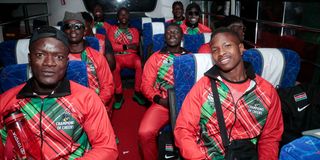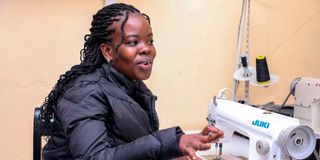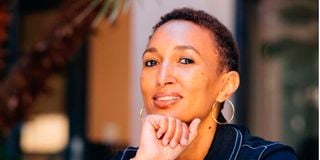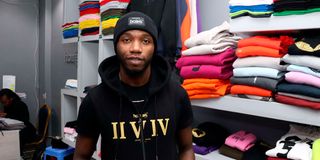Vivo, young designers and pastoralist women who fine-tuned Olympics attire

Kenya Shujaa players Lamec Ambetsa (left) and Samuel Asati wit teammates inside Cfao Mobility Kenya Mercedes Bus on July 8, 2024, when the team departed for the 2024 Paris Olympics Games, from Moi International Sports Centre, Kasarani.
From the intricate details of acrylic nails and carefully styled hairstyles to the refined elegance of tailored blazers and bespoke suits, the 2024 Paris Olympics became a grand stage that celebrated the boundless creativity of designers from across the globe. Each participating country took great care to dress their athletes in attire that not only showcased their cultural heritage but also underscored their national identity and social standing on this prestigious international platform.
Mongolia's opening ceremony attire quickly became the centerpiece of global conversations, with its fashion-forward design that boldly celebrated the country's rich cultural heritage through the prominent display of the falcon flag. Despite the significant challenges faced by Haiti, the Haitian-Italian designer Stella Jean emerged as a beacon of hope, using her creative talents to craft outfits from cotton and recycled fabrics, beautifully brought to life with vibrant prints designed by the Haitian painter Philippe Dodard.
Closer to home, South Sudan made its Olympic debut with a basketball team that commanded attention in structured black suits, elegantly accented with the colors of their national flag through finely beaded details on their sleeves and pockets—a stunning creation by the Rwandan brand Moshions. Not to be outdone, the Egyptian delegation stood out in the crowd with their impeccably tailored white suits, crafted from the finest Egyptian cotton by the esteemed brand Concrete.
As we turn our focus to Kenya, a question arises: What does it truly take to produce a ceremonial kit that can stand shoulder to shoulder with the world’s best? Are Kenyan fashion houses up to the task of handling large-scale production for such a prestigious event? And, perhaps most importantly, do we possess a distinct brand identity that resonates with the spirit of Kenya?
In Africa, there is a saying that it takes a village to raise a child, and the creation of Team Kenya’s ceremonial kit was a collaborative effort involving many stakeholders, each playing a vital role from the initial sketch to the final product that graced the global stage.
Kovu Couture, led by the talented Joy Wanja, captured the spotlight just a month ago when Joy was named the Olympic ceremonial kit designer following a competitive selection process organized by the Ministry of Sports and Youth Affairs. For a designer who established her brand a mere six years ago, managing an order of over 100 outfits was no small feat.

The Owner of Kovu Couture Joy Wanja during the interview at her workplace in Ngara, Nairobi on Monday, July 29, 2024.
Recognising the challenge, Wandia Gichuru, the founder and CEO of Vivo Fashion Group, generously stepped in to assist with the production of the opening ceremony dresses. Together, Joy and Vivo meticulously crafted the women’s dresses, while the men’s attire was expertly handled by Smiles Collection.
“The opportunities in the merging of fashion and sports are endless, and this is an untapped niche market. But teamwork is everything,” she said.
Joy is currently channeling her creative energy into designing the attire for the Paralympics Opening Ceremony.
This is another very exciting project, and I am happy to be learning how to create inclusive fashion and how to grade different patterns that are inclusive of accessibility features for ease of comfort and wearability,” says Joy.
Throughout this high-pressure project, Wandia provided invaluable mentorship to Joy, guiding her through the multiple phases of production that required quick adaptation to unforeseen challenges. Vivo Fashion Group, looking ahead, aspires to establish itself as a creative hub where young designers can be mentored in the intricacies of mass production, fabric selection, and the technical aspects of the fashion industry.

Wandia Gichuru is the founder of Vivo Fashion Group.
For the Olympic attire, Joy carefully selected “Canada,” a stretchy cotton and polyester blend that was both lightweight and comfortable for the Parisian summer. For the men’s shirts and pants, she chose “Kobe,” a 100 percent cotton fabric known for its durability and comfort. The intricate embroidery that adorned the dresses was outsourced to a third-party production house, ensuring that every detail met the highest standards of craftsmanship.
Closing ceremony fabric print
The fabric print for the closing ceremony was a masterpiece created by 23-year-old Georgia Fernandes, a designer who is currently pursuing her Master’s degree in architecture at Columbia University in New York.
Despite her demanding academic schedule, Georgia skillfully balanced her college work with the intricate process of sampling and producing the closing ceremony attire. Drawing inspiration from Kenya’s breathtaking savanna, diverse wildlife, and the vibrant spirit of its people, Georgia brought her vision to life through a combination of digital tools and hand drawings.
The final kit, produced by the brand Home 254, was a testament to the immense talent and potential of young Kenyan creatives, as it was showcased alongside renowned international fashion labels on this global stage.

Job Brian Jura - Founder and CEO JbeeJura Designz – Home 254 during the interview in Nairobi.
“Our athletes have the potential to be fashion icons and can collaborate with consumer brands that tap into the sports sector as well as the development of strong local teams that can market fashionable sports merchandise,” Wandia said, “And the Kenyan flag will always be our unifying symbol and can be creatively incorporated into creative designs that sell ‘Brand Kenya’ globally.”
Ushanga Beadwork
Adding a distinctively Kenyan touch to the ceremonial collection was the Ushanga Kenya Initiative, an organisation under the Ministry of Gender, Culture, Arts, and Heritage. Established in 2018, Ushanga Kenya is dedicated to empowering pastoralist women by organising them into groups and providing them with training in the traditional craft of beadwork.
For the Olympics, these skilled women created Maasai ceremonial headgear, neckpieces, and shield handcuffs for the female athletes, as well as bracelets for the men. A total of 146 women from six cooperatives—Omom Enkai Beadworks, Namayiana Cooperative, Osiligi Oishu, Nasaru, Nanyorai, and Litoronken Manyatta Women Groups—came together to produce these exquisite pieces.
“When the women were informed that they would be working on the Olympic accessories production for both the female and male athletes they were extremely honoured. It was a dream come true for them,” said Esther Mwanyama, the deputy programme director at Ushanga.
This was the first time Ushanga worked on an Olympic order, but they had previous experience working on orders for the Deaflympics, the Commonwealth Games, and the Under 20 World Athletics.
For the first time in Olympic history, Kenyan male athletes proudly wore hats adorned with beadwork that uniquely represented the nation. This exceptional beadwork was produced by Zanta Adeyde, an eco-conscious fashion brand founded in 2020 by Anyango Adeyde. Zanta Adeyde specializes in creating jewelry and accessories from upcycled materials, while also empowering young artisans in Kibera.

This collaborative experience underscores the vast potential for growth in merging sports and fashion in Kenya. Our athletes have the opportunity to become fashion icons, and by forging partnerships with consumer brands, they can help to promote 'Brand Kenya' on a global scale.
The Kenyan flag, a powerful symbol of unity, can be creatively incorporated into fashion designs that resonate with audiences around the world, further cementing Kenya’s place on the international stage.




